Lawyer Salary in Canada – Updated 2025
On average, a lawyer in Canada earns $100,090 per year.
However, various factors, such as experience and area of practice, can influence a lawyer’s earning potential.
- Lawyers in the 25th percentile are typically newer to the role and still developing their skills. Lawyers in this category on average earn between $80,000 (for first-year lawyers) to $198,500 (for those with 10+ years of experience).
- Lawyers in the 50th percentile are those who are more familiar with their roles and are capable of handling their responsibilities independently, without requiring supervision. Earnings in this category range from $95,750 (for first-year lawyers) to $230,000 (for those with 10+ years of experience).
- Lawyers in the 75th percentile are more experienced, often with advanced qualifications, and are ready for the next stage of their careers. With their enhanced skill sets, their earnings range from $120,250 (for first-year lawyers) to $278,250 (for those with 10+ years of experience).
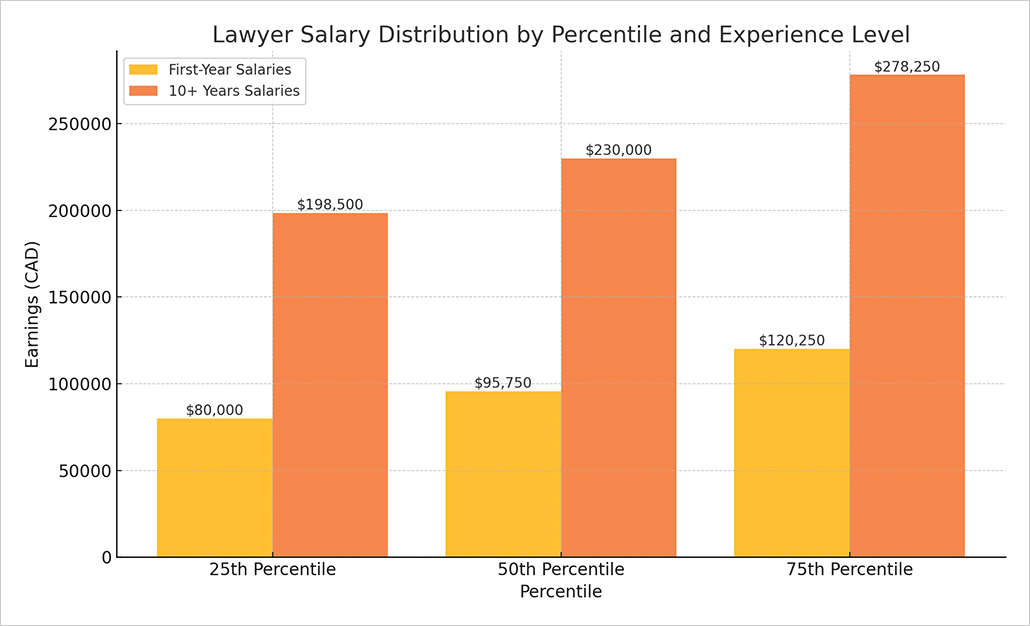
Salary by Province and Territory
The average salaries of lawyers vary across the Provinces and Territories of Canada. This can be for a number of reasons, such as the differences in the cost of living or demand for legal services in each Province or Territory. The Northwest Territories has the highest average salaries, while Newfoundland and Labrador has the lowest.
According to Indeed, the average salaries in each Province and Territory, ordered from highest to lowest, are as follows:
- Northwest Territories: $123,220
- Saskatchewan: $120,767
- Yukon: $120,699
- Nunavut: $112,532
- Nova Scotia: $106,892
- Quebec: $101,793
- British Columbia: $101,620
- Ontario: $101,188
- Alberta: $92,974
- New Brunswick: $83,872
- Manitoba: $76,741
- Prince Edward Island: $63,809
- Newfoundland and Labrador: $66,307
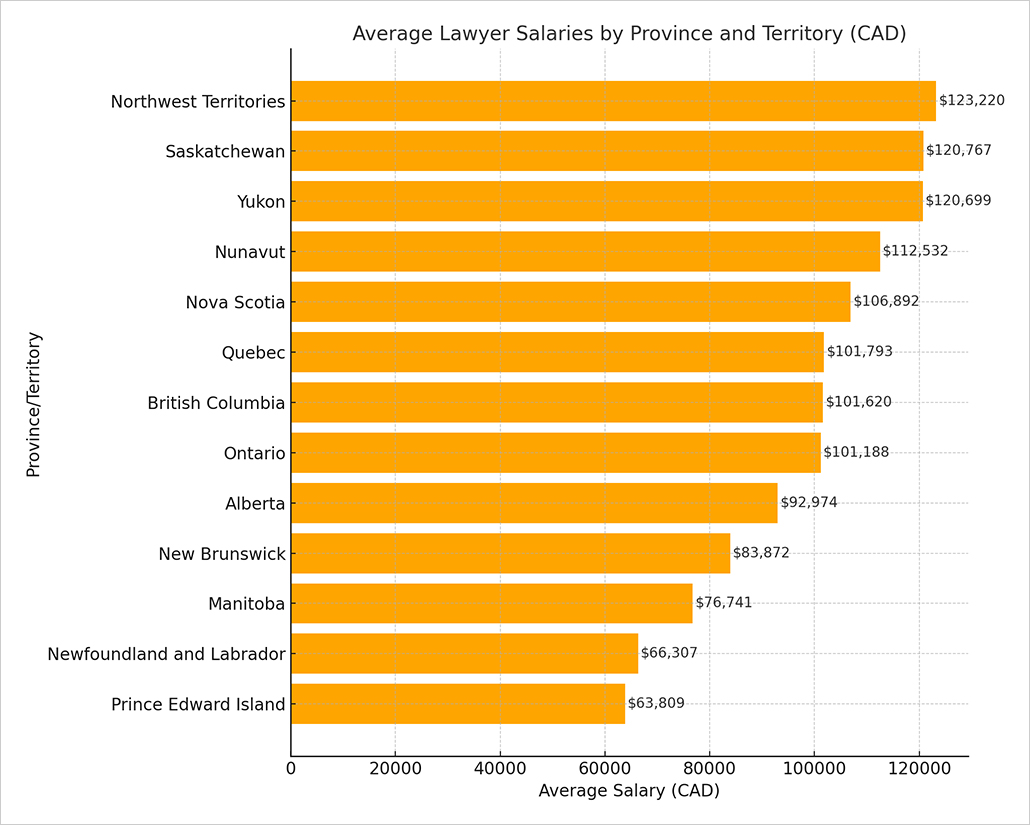
Salary by Area of Law
A lawyer may specialize in various different legal fields. Each field requires different experience and skill sets therefore affecting earning potential. Immigration lawyers have the highest average salary, while criminal lawyers have the lowest across Canada.
According to Talent.com, the average salary for different practice areas across Canada, ordered from highest to lowest, are as follows:
- Immigration law: $183,486
- Real estate law: $170,000
- Corporate law: $150,000
- Intellectual property law: $130,000
- Family law: $125,000
- Criminal law: $120,000
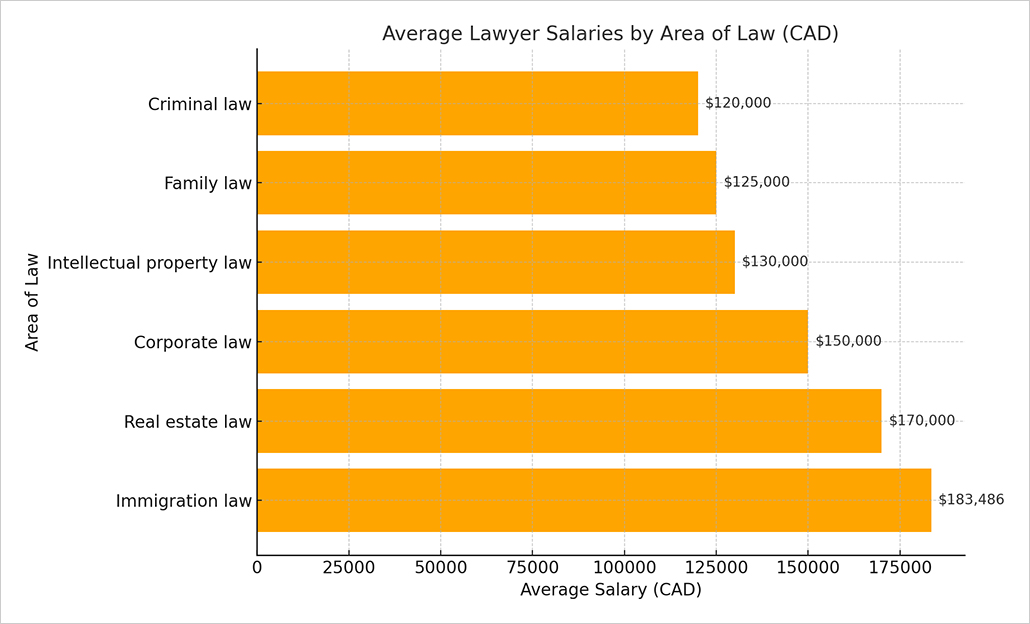
Salary by Experience Level
One of the factors influencing a lawyer’s earning potential is experience. As lawyers gain more experience, their earning potential increases, as demonstrated below:
- Entry-level salaries: average earnings for lawyers with 0-5 years of experience range from $80,000 to $178,250
- Mid-level salaries: average earnings for lawyers with 6-10 years of experience range from $121,250 to $227,500
- Senior-level salaries: average earnings for lawyers with 10+ years of experience range from $198,500 to $278,250
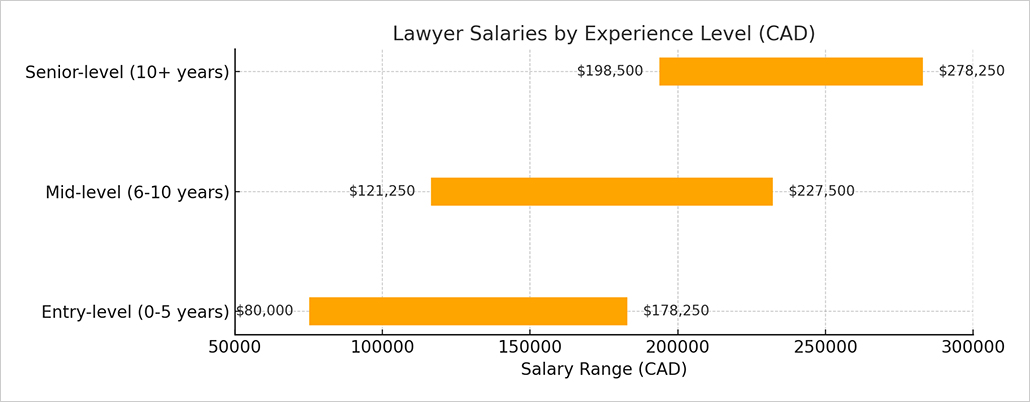
In-House vs. Law Firm Salaries
An in-house corporate lawyer works directly for a company as part of its corporate legal department, typically working on a fixed income and schedule. On the other hand, a lawyer working at a law firm will handle clients on a case-by-case basis, often representing multiple clients and experiencing a more variable income and schedule, depending on their current workload. As such, lawyers at a law firm may struggle with their work-life balance, as they may be on-call or required to work longer hours compared to an in-house lawyer. However, law firms generally offer a wider range of clientele, which provides lawyers the opportunity to gain experience dealing with a variety of different cases.
As with any legal profession, a lawyer’s salary varies with experience. Below is a comparison of the salaries between in-house corporate lawyers and those working in law firms at various levels of experience:
- 0-3 years of experience:
- In-house: $94,250-$141,000
- Law firm: $80,000 – $158,500
- 4-9 years of experience:
- In-house: $112,500 – $168,000
- Law firm: $121,250 – $227,500
- 10+ years of experience:
- In-house: $131,000 – $193,250
- Law firm: $198,500 – $278,250
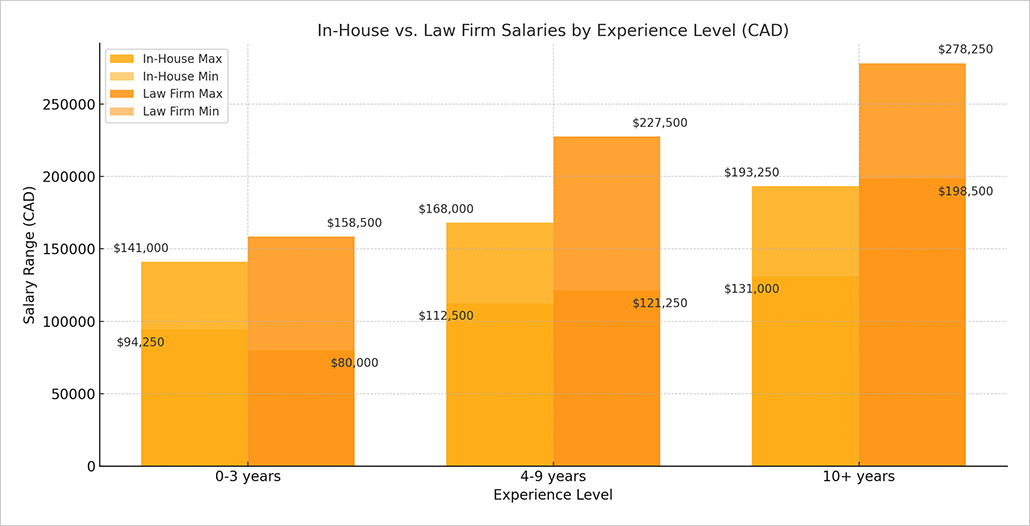
Size of Firm and Impact on Salary
While experience plays a significant role in a lawyer’s earning potential, other factors, such as the size of the law firm, should also be considered. Smaller law firms, typically those with fewer than 10 lawyers, generally handle fewer cases compared to larger firms with 50 or more lawyers. Having more lawyers working at a firm allows them to handle more clients, which may lead to higher salaries. However, advancing positions in a larger law firm can be more challenging due to the increased competition, whereas in a smaller law firm, becoming a partner may be more attainable.
Bonus and Additional Compensation
Lawyers can receive bonuses in a variety of different ways that may not always be financial. For instance, some employers may offer additional vacation days, gifts, or team dinners as rewards. Typically, employers set targets for each fiscal year, and bonuses are determined based on reaching or exceeding those targets. For example, a lawyer who excelled at a certain task may receive a bonus at the end of the year. Other financial incentives, such as profit sharing programs, may also be available.
However, additional compensation often varies depending on the firm type, region, and experience of a lawyer. Larger law firms tend to generate higher annual profits, allowing for lawyers to benefit through profit sharing programs or other bonuses. Moreover, a lawyer’s experience plays a significant role in earning additional compensation, as seasoned professionals are often better equipped at meeting or exceeding goals set by employers.
Gender and Diversity in Salaries
According to Law.com, male lawyers in Canada earn an average of $189,317, compared to female lawyers who earn an average of $169,494. Furthermore, lawyers from visible minorities earn, on average, $23,000 less than their counterparts. Additionally, the salary gap between gender tends to widen in senior-level positions.
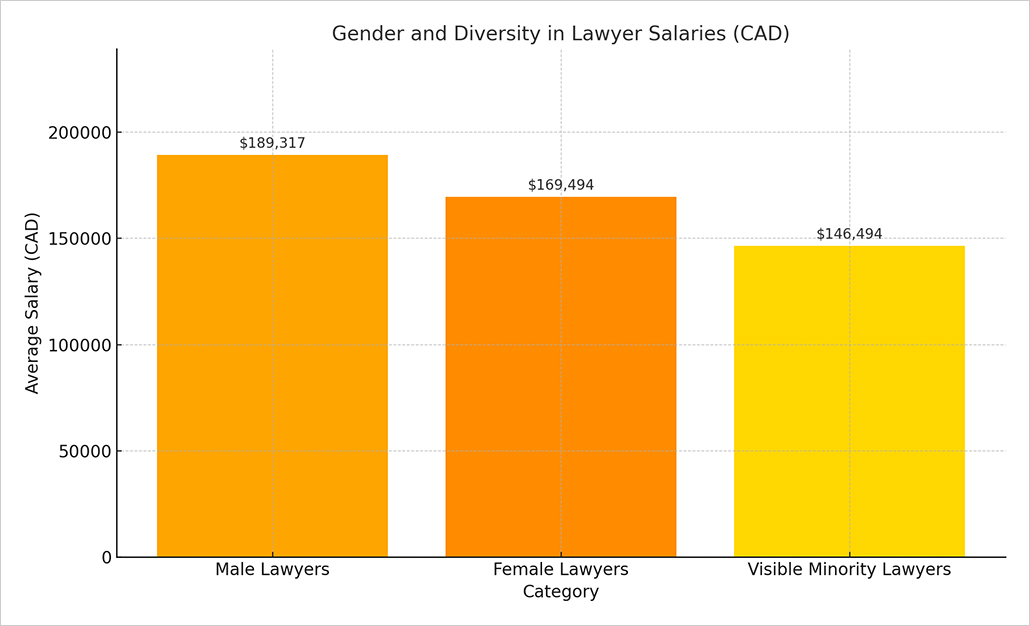
Future Outlook and Trends
According to Jobbank.gc.ca, the projected demand for lawyers in Canada over the next 5-10 years seems to be fairly stable, as the relative supply and demand for future job positions are expected to remain balanced. Although British Columbia is expected to see limited job growth within the next three years, most of the other provinces and territories in Canada are forecasted to see moderate to good levels of growth within the legal profession.
However, as the workload has been steadily on the rise for lawyers, the demand for lawyers is expected to increase, which in turn, increases salary growth.
Comparison with Other Professions
The legal profession offers a high earning capacity, however, there are many other professions that provide the opportunity of high-earnings. According to Indeed, below is a comparison of the average salary of other high-earning professions in Canada, in order from highest to lowest:
- Doctor: $238,285
- Dentist: $180,220
- Veterinarian: $129,641
- Lawyer: $100,090
- Architect: $100,202
- Engineer: $94,731
- Pilot: $85,926
- Accountant: $63,978
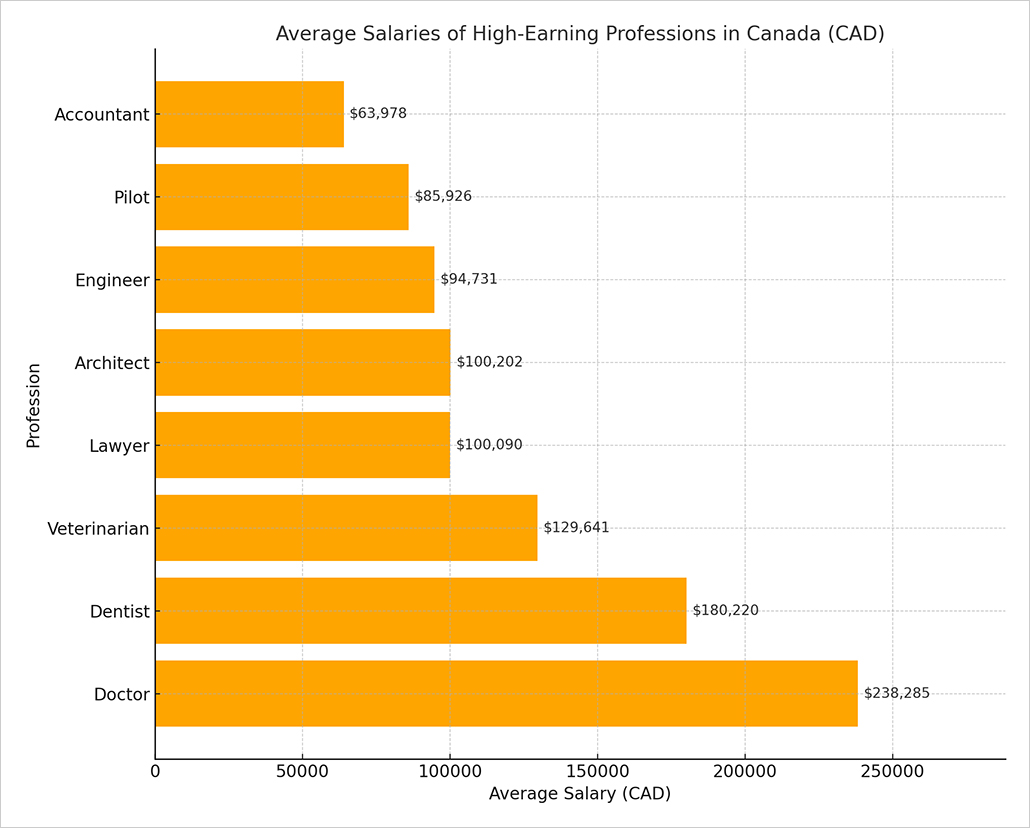
Conclusion
There are many opportunities for career growth and increased earning potential within the legal profession across Canada. A variety of factors, such as experience, field of specialization, and whether a lawyer works in-house or at a law firm, influence the salary of a lawyer. Compensation and bonus packages also vary from employer to employer. Ultimately, as with any profession, the more experience a lawyer gains, the higher their earning potential.
About The Author







